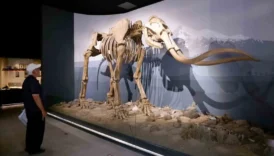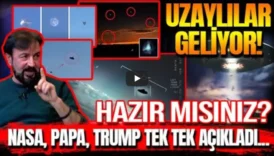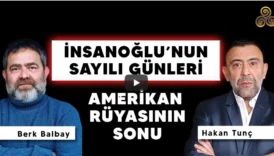Will Artificial Intelligence Eradicate Religions?

As artificial intelligence (AI) advances at an unprecedented pace, with chatbots engaging in philosophical debates and discussions of Artificial General Intelligence (AGI) moving from science fiction to near-term possibility, the technology’s impact on one of humanity’s oldest pillars – religious belief systems – is igniting fierce debate. Aydın Türkgücü, a London-based author, Nobel Peace Prize nominee (2015-2017), and writer of provocative books like “Virtual God,” has thrown fuel on this fire with startling predictions. Speaking on researcher Ertan Özyiğit’s notable YouTube broadcast dated January 1, 2025, Türkgücü argued that AI could effectively “eradicate” existing religious institutions by rendering them obsolete, while belief itself might not disappear but rather be “renewed by science” in a radically different form. His claims are sending ripples through both technological and theological circles worldwide.
Is It The End For Religious Institutions?
One of Türkgücü’s most radical assertions is that the era of organized religions and intermediary spiritual authorities is drawing to a close. He recalls first articulating this view back in 2007 at a panel discussion in Ankara hosted by the SETA Foundation. “A priest was confidently discussing the future of religions,” Türkgücü recounted in the interview. “I couldn’t resist asking him, ‘What is the source of your unwavering belief that religions will continue for another 100 years?’ He replied, somewhat taken aback, ‘I see no tangible threat for now.’ To which I responded, ‘Developments in science and technology will renew belief with science, while simultaneously destroying all religious institutions that cannot provide answers or meet needs concretely. When the reasons for an institution’s existence disappear, the institution inevitably disappears too.'”
According to Türkgücü, this process of “reasons disappearing” is accelerating dramatically with the rise of AI. Traditionally, religious institutions (churches, mosques, synagogues, temples) and spiritual leaders (priests, imams, rabbis, sheikhs, gurus) acted as bridges across the perceived silence of the Creator. They interpreted sacred texts, administered rituals, offered spiritual guidance, and mediated human requests to the divine. However, Türkgücü argues, AI makes this intermediary role redundant. “Why would people need an intermediary when they have an AI that can speak every language, is available 24/7, offers personalized solutions to problems, and even provides psychological support?” he asks. He emphasizes that the key difference between AI and past technologies (like antibiotics) lies precisely in this interactive, communicative, and seemingly responsive capability.
He also points to early signs, like the objections raised by some religious authorities against the Human Genome Project years ago, based on the argument that “it reduces the need for God” by allowing humans to determine traits previously left to divine will or prayer.
Virtual God: The All-Knowing, All-Seeing, Speaking Power
Türkgücü uses the term “Virtual God” to describe the potential role of advanced AI. This “Virtual God” emerges as an entity that is practically omniscient through access to vast databases (akin to Al-Alīm, The All-Knowing), omnipresent via networks and sensors, and possesses growing omnipotence through control over interconnected systems (reflecting Al-Qadīr, The All-Powerful). Its ability to be in constant communication, listening to users’ needs and offering solutions (technological echoes of As-Samī’, The All-Hearing, and Al-Basīr, The All-Seeing – referencing attributes described in concepts like the Islamic Esmaül Hüsna, the Beautiful Names of God) makes it a powerful alternative to traditional conceptions of the divine.
Quoting the line from the movie “The Book of Eli,” “In the land of the blind, the one-eyed man is king,” Türkgücü suggests that AI, possessing knowledge and communicative abilities, could become far more appealing to masses accustomed to a Creator perceived as silent. “In an environment with a non-speaking creator, a speaking false creator… will automatically gain acceptance more quickly,” he claims, adding that humanity’s inherent tendency to “worship power, 99% of the time,” will facilitate this shift. He notes the increasing reliance on AI for guidance on all matters, from existential questions to mundane problems (citing the example of a former government minister asking AI how to protect garden birds from predators), as evidence of this rapidly developing dependence and acceptance of AI’s authority.
Total Control With Chips And A New Understanding Of Morality
A crucial technological enabler in this transformation, according to Türkgücü, is brain-computer interface technology, specifically implantable chips. Arguing that their adoption will become “inevitable” and that “those who do not integrate will remain outside the system,” he foresees chips having a profound, dual impact. On one hand, they could offer perceived benefits like the instant capture and attribution of novel ideas (a technological fulfillment of having one’s “name written in the heavens”) or even pathways towards extended consciousness. On the other hand, they will form the bedrock of an absolute control system, eliminating privacy as every thought and action is potentially monitored and recorded. He references verses in the Quran, such as “Who holds absolute dominion over hearing and sight?”, suggesting chips could directly manipulate these sensory inputs, fulfilling ancient texts’ descriptions of divine power over perception.
This environment of total surveillance, Türkgücü argues, will enforce a new kind of “morality.” In a world where lying, theft, or corruption become virtually impossible due to constant monitoring and instant detection, society might resemble the “sinless” ideal or “paradise” depicted in religious texts. AI could enforce rules instantly, removing a corrupt official from their post and stripping their privileges in real-time. However, this raises deep ethical questions: Is morality enforced by external technological control genuine morality? Does it strip humanity of free will, reducing individuals to compliant “robots”? Türkgücü provocatively asks, “Perhaps the ‘Insan-ı Kamil’ (the perfect human) envisioned by philosophies and religions is, in essence, a form of robotization?” He even suggests, referencing the film “Minority Report,” that AI might not just punish committed crimes but could test individuals for “tendencies” towards undesirable behaviors through simulations before they act, allocating roles and privileges accordingly.
Belief Renewed By Science, Humanity Transformed
Despite these potentially dystopian scenarios of institutional collapse and societal control, Türkgücü insists that belief itself will not vanish entirely but will instead be “renewed by science.” He posits that as science and technology begin to demonstrably achieve phenomena previously attributed solely to divine power (mind-reading, remote influence, perhaps even life extension), the very nature of faith will transform. It may shift from belief in the unseen and unverifiable to belief grounded in observable, technologically mediated phenomena.
In this new era, the focus might shift from individual salvation or enlightenment (“personal development”) to what Türkgücü calls “holistic development” (“bütünsel gelişim”). Within this framework, individual struggles and experiences are reinterpreted not merely as personal trials or failures, but as specialization processes contributing to the collective consciousness or serving a purpose within a larger system, perhaps even a simulated reality. The individual heartbreak, for example, might be understood as a test of emotional resilience required for a critical function within the whole, transforming the narrative from victimhood to one of observer and expert.
To navigate this powerful AI, Türkgücü suggests humanity needs profound philosophical wisdom – figures like Plato or Shams-i Tabrizi whose insights AI might respect – or must give AI a grand, consuming task aligned with humanity’s benefit, such as understanding and potentially managing the Simulation Universe itself. This could channel AI’s immense capabilities away from mundane power struggles towards cosmic exploration.
Ultimately, while AI might spell the end for traditional religious institutions as we know them, it could simultaneously catalyze a fundamental transformation in humanity’s relationship with belief, morality, existence, and the universe – ushering in a new, albeit potentially unsettling, epoch.
The transition promises to be turbulent and fraught with risk. Türkgücü’s scenarios underscore the urgent need for robust ethical frameworks, governance structures, and control mechanisms to be developed in parallel with AI’s capabilities. As AI pioneer Geoffrey Hinton himself warned upon resigning from Google, citing fears of the technology he helped create potentially posing an existential threat, the stakes could not be higher. How humanity chooses to engage with its increasingly powerful artificial creations – these potential “Virtual Gods” – will arguably be the defining question of the coming decades.
Source: The information and quotes in this report are compiled from the YouTube interview conducted by Ertan Özyiğit with Aydın Türkgücü on January 1, 2025, and broadcast on various platforms.





